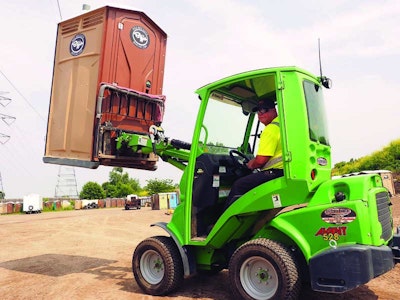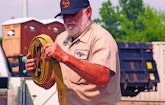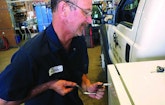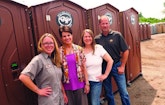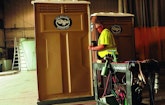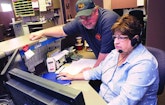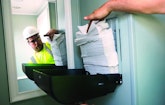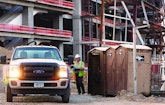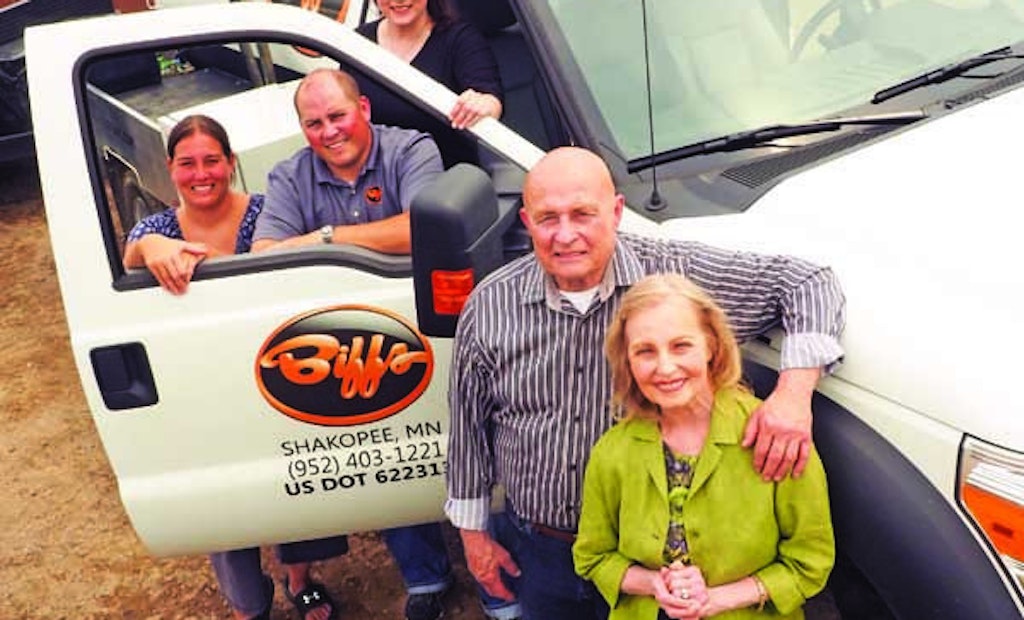
Interested in Pumps?
Get Pumps articles, news and videos right in your inbox! Sign up now.
Pumps + Get AlertsPassing a family business on to the next generation can be a volatile and emotional experience for everyone involved and leave staff, customers, vendors and lending institutions feeling anxious and uncertain. Yet all multigenerational businesses have to endure this transition. Wastewater business owners can learn valuable lessons from a family that’s emerged from this succession healthy, happy and ready for growth.
When Biffs Inc. owners Mike and Diana Pauling were ready to pass their company in Minnesota’s Twin Cities on to their children, Heather and Derek, the family dealt with these tough and sensitive issues head on. In addition to lawyers and accountants, they worked with a management consultant who helped them keep the lines of communication open, work through emotions and figure out roles, responsibilities and timelines. They then proceeded through the process in a slow, methodical and transparent fashion.
Working out of a 4-acre facility in Shakopee, Minnesota, Biffs serves a 50-mile radius around Minneapolis and St. Paul. Staffing fluctuates seasonally, but there’s about 30 drivers, eight shop and yard technicians and mechanics, and 20 office personnel. Derek serves as president and CFO, and Heather as vice president and COO, but Derek Pauling says they’re team-oriented in their decision-making.
COMPANY BACKGROUND
After working for portable sanitation industry manufacturer Satellite Industries for 10 years, Mike Pauling struck out on his own in 1986 and bought Biffs, a restroom service company with 200 units, three trucks and a couple of employees. He slowly built up the business, but growth was explosive when he bought the portable restroom divisions of Waste Management and BFI in Minneapolis. He brought on two partners and continued making acquisitions. At one time they had five Twin Cities locations and another in northern Minnesota.
In 1997 Biffs became more of a family business as Mike bought out his partners, Diana started working full time, and Derek graduated from college and came on board, joining sister Heather who had done so in 1994.
From 1997 to 2008 they made a few more acquisitions, started a roll-off container division (sold in 2014) and began offering storage containers through a third party. Diana retired in 2009, and Heather and Derek became more involved in day-to-day management. This year Mike stepped aside and handed over the reins.
CHANGING HANDS
Derek Pauling gives a lot of credit to his father for helping smooth the way for the change in ownership by being willing to let go. But it was tough at first, he says.
“It wasn’t because of us, but when you’ve built your own company and you’re used to making all the decisions and then someone else is making the decisions, you want to interject yourself into everything.”
The legalities were straightforward. “It’s just a standard buyout,” Pauling says. “We have a note with our parents that we’re paying on.” The shareholder agreement was a little more complicated. “We each have two kids, and we’re trying to look out for when they’re older, what is the process for having them involved.”
The more difficult aspect of the buyout involved emotional issues, giving up control and how to divvy up the responsibilities. To help them, the Paulings brought in Melissa Albers from The Authentic Leader, a management consultant who had worked with the company from 2005 to 2008. She helped them set up a process in which the siblings began to take more and more control over a three-year period, allowing Mike to become comfortable with them as managers.
Albers worked with Heather and Derek on how to split up management duties, be better leaders and work effectively together, viewing their different personality styles as a source of strength – she being more introverted and detail-oriented, and he being the relationship builder and generalist.
Pauling says another big part of the successful transition was including the company’s leadership team in the process. Albers worked with each of them on leadership skills and spelling out roles and accountabilities. “Heather and I can’t do everything here. If we tried, the company’s going to fail,” Pauling says. “So we’re doing everything we can to empower all our managers to help us make decisions and follow our core values.”
Some of those core values were established a long time ago by his father. “My dad always said it’s about protecting the health, welfare and dignity of those recreating and working in the field. We basically live by that. Everybody deserves clean facilities.”
Pauling’s advice about family succession: Don’t rush the process. “You need to have employees on board and you have to have all your ducks in a row as far as going through these tough conversations, because they can be heated. Some people might have emotional pieces to it, and certainly my parents did. It’s hard to let go. If you think this happened overnight, you’re mistaken.”
THE COMPANY TODAY
Today, the company has an inventory of nearly 6,000 units (dark brown fronts, tan sides), mostly from Satellite. They like to keep their 600 to 700 event-only units under 3 years old. The ADA-compliant and high-rise units and hot-water vanity sinks are from PolyPortables LLC, and they’ve got 45 PolyJohn Enterprises
Mini-Flushes for hard-to-reach spots. They currently have four restroom trailers – Ameri-Can (32 feet), Black Tie Products (22 feet) and Satellite (14 feet and 25 feet) – and plan to add more in the future. Most of their 12 transport trailers – one 14-unit hauler, two 20-unit, nine 16-unit – were built in-house, with a few from F.M. Manufacturing.
About 50 percent of their business is construction, 35 percent non-construction facilities without permanent restrooms (such as parks) and 15 percent special events.
Their largest construction project currently is U.S. Bank Stadium for the Vikings NFL football team. They’re also working on adjacent projects as the area around the stadium is being redeveloped. “Within about a three- or four-block area we’ve got 500 services a week,” Pauling says. “It’s exciting because it’s such a high-profile project.”
Notable events include the Major League Baseball All-Star Game, a BMW motorcycle rally, the upcoming 2016 Ryder Cup and the 2018 Super Bowl. The company doesn’t hesitate to team up with competitors for some of these larger events. “There’s no bad blood between Biffs and competitors,” Pauling says. “And that’s the way we like to keep it.”
They also do all the events at TCF Stadium (Rolling Stones, Luke Bryan, U2) and especially enjoy providing units for their tailgate parties. “For each game we put out about 170 standard units, 30 ADAs, sinks, hand sanitizers. We have to have them in early Saturday morning and pick them up Saturday after the game, and it happens continuously.” That’s on top of other events and regular routes, he notes. “Once May hits, it’s like a machine – deliver, pick up, destock, de-garbage, power wash, disinfect, reload, go back out.”
Extra one-on-one training is provided for event technicians. “We’re very passionate about our events,” Pauling says. “We go over the top for our customers, nailing down all the details with the maps, the placement, the timing, the safety if there’s pumping during an event, the cleanliness, and how they’re placed on flat ground. The customer doesn’t have to think about it; they know it’s going to happen.”
THE FLEET
The company has 32 vacuum trucks, 2005 to 2015, over half of which are less than 3 years old. The newest ones are Ford F-550s with 600-gallon waste/350-gallon freshwater steel tanks. The others are Internationals with 900- to 1,500-gallon waste/300- to 500-gallon freshwater mostly steel tanks, and Chevrolets with 700-gallon waste/300-gallon freshwater steel tanks, all built out by Satellite. Pumps are from Masport and Conde (Westmoor Ltd.). All have trailer hitches and fold-down racks to haul two units.
Routing of their 5,000 to 5,500 services a week (7,000 in the summer) is done with the help of Roadnet Technologies software. Each night from 4 p.m. to midnight, a routing specialist works with the program to plan the next day’s schedule, which is then uploaded to the cloud. The next day, drivers log onto the system using smartphones, and the system voice-navigates them through their day (in English or Spanish). Information is fed back to the system so everyone can see where a driver is at all times. “It took a couple years to smooth out all the bumps and get everyone trained,” Pauling says, “but it’s amazing.”
COMPANY INNOVATIONS
Biffs is always looking for ways to improve processes and procedures, and that often means designing things themselves. For example, in the 1990s Diana Pauling focused on systems development and worked with a third party to build their own customer management and billing program they called WIZZEN. It’s been in use since, although Heather will soon look to replace it with a customizable, out-of-the-box program that melds nicely with Roadnet.
All vacuum trucks are outfitted with the company’s proprietary cleaning system called The Pathfinder developed by Biffs in 2012 with Ecolab. The system replaces the bucket and scrub brush with a company-designed power washer/disinfectant two-position wand. Derek Pauling says units get cleaner and smell better, service is faster, and technicians are happier. “That was an innovation we brought to our company,” he says. “Now it’s just a standard that we disinfect every surface.”
Another company-developed system is their brine and methanol process used to prevent holding tanks from freezing in Minnesota’s severe winters. “We developed our own system that will handle the volume we need,” Pauling says. “From November to March we mix 10,000 pounds of salt into brine every other day.” The amount of salt can be adjusted anywhere from a 1/4 pound per gallon of water to 2 pounds. If the temperature goes below zero, an automated system adds an appropriate amount of methanol based on the 10-day weather forecast. Technicians put salt pellets in urinals to prevent the solution from becoming diluted by customer use.
To improve driver performance and morale they developed an incentive program based on two factors drivers are assessed against on a monthly basis – the quality of their cleaning as determined by a quality-assurance manager and a comparison of their actual route times versus estimated. If they meet or exceed those criteria their hourly pay goes up for the month. “It’s been pretty exciting for the guys,” Pauling says. “It’s a different style of managing them – rewarding them instead of getting down on them.” Those not meeting the criteria are counseled on how to improve.
WELL-POSITIONED FOR THE FUTURE
As they come up on the 30-year mark, Pauling feels the company is on solid footing after the transition with all parties on board. “Right now I don’t think we’ve ever been in a spot this good with our staffing and how people feel the company is going.”
The siblings like to keep their parents updated on what’s going on. “We call it the elders meetings,” Pauling says. “A fireside chat among me, my wife (Jennifer, a preschool teacher who works part time for the company), Heather and our parents.”
Heather and Derek are grateful to their parents for the huge amount of effort they put into building the business, giving them a successful company to inherit. “When my dad started this he did everything himself – routes, repair, billing, sales,” Pauling says. “The two of them have just worked so hard over the last 29 years. It wouldn’t be going into the second generation without their efforts of building something so amazing.”
Help when you need it
Sometimes a company wants to offer a service to its customers, but it just doesn’t make economic sense. One solution Derek and Heather Pauling, owners of Biffs Inc., have found is working with third parties.
For example, for event service they like offering on-site attendants to keep portable restrooms and luxury trailers stocked and clean. “We used to do our own attendant work, but what we discovered is staffing is difficult because we don’t have enough hours for our guys to do it, and if we hire people off the street you don’t have the professional image,” Derek Pauling says. They contracted with The Vanella Group to provide the service and it turned into a win-win for everyone.
When they started offering storage-container rentals in 2005 they contracted with Dart Portable Storage to provide the units, giving customers one-stop shopping and billing. “It’s more of a value-add service that we provide for these people, and they love it,” Pauling says.
The company doesn’t outsource their pickup and delivery work, but they are experimenting with using third-party delivery trucks in the summer rather than buying vehicles every year to accommodate the seasonal spike in business. In 2015 they rented four Chevy 3500 and Ford F‑350 flatbeds from Enterprise Commercial Rental and outfitted them with Satellite 300-gallon waste/150-gallon freshwater slide-in tanks. At the end of the season the trucks can be purchased or simply returned.
“We’re trying to be responsible with our spending,” Pauling says. “This way we don’t have any cash going out the door. And if there’s a hiccup in the economy we’re not putting ourselves out there.”
